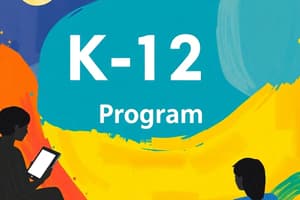Podcast
Questions and Answers
What is one of the main objectives of TLE?
What is one of the main objectives of TLE?
- Limiting skill exposure to one sector
- Promoting theoretical knowledge only
- Fostering entrepreneurial skills (correct)
- Enforcing rigid job structures
Which component of TLE primarily focuses on household management?
Which component of TLE primarily focuses on household management?
- Home Economics (correct)
- Agriculture
- Industrial Arts
- Business Education
What teaching method is emphasized in TLE to enhance teamwork skills?
What teaching method is emphasized in TLE to enhance teamwork skills?
- Lecture-based instruction
- Collaborative projects (correct)
- Standardized testing
- Independent study
How is student assessment conducted in TLE?
How is student assessment conducted in TLE?
What future trend is expected to be integrated into TLE?
What future trend is expected to be integrated into TLE?
Flashcards are hidden until you start studying
Study Notes
Introduction to TLE (Technology and Livelihood Education)
- TLE is an educational program aimed at providing knowledge and skills in technology and livelihood.
- It prepares students for practical living and employment opportunities in various industries.
Objectives of TLE
- Skill Development: Equip learners with technical skills for different trades and professions.
- Entrepreneurship: Foster entrepreneurial skills and promote self-employment.
- Life Skills: Develop critical thinking, decision-making, and problem-solving abilities.
- Work Ethic: Instill a sense of responsibility and professionalism.
Key Components of TLE
- Agriculture: Introduction to farming, animal husbandry, and agricultural practices.
- Home Economics: Focus on cooking, nutrition, sewing, and household management.
- Industrial Arts: Hands-on training in carpentry, metalwork, and electronics.
- Business Education: Basics of accounting, marketing, and management principles.
TLE Curriculum Structure
- Divided into practical and theoretical components.
- Emphasizes experiential learning through workshops and projects.
- Encourages collaborative projects to enhance teamwork skills.
Importance of TLE
- Prepares students for real-world challenges in various sectors.
- Enhances employability by providing marketable skills.
- Contributes to personal development and self-sufficiency.
Teaching Methods in TLE
- Practical demonstrations and hands-on activities.
- Group discussions and collaborations.
- Project-based learning for real-life application.
Assessment in TLE
- Evaluation through practical tests, projects, and class participation.
- Emphasis on both skill proficiency and theoretical knowledge.
Future of TLE
- Evolving with technology advancements (e.g., digital literacy, coding).
- Integrating sustainability practices and modern agricultural techniques.
- Promoting lifelong learning and adaptability in various careers.
Introduction to TLE
- TLE (Technology and Livelihood Education) is an educational program focused on preparing students for practical living and work opportunities.
- It equips them with skills in technology and livelihood practices.
Objectives of TLE
- Skill Development: Provides learners with technical skills for different trades and professions.
- Entrepreneurship: Encourages entrepreneurial skills and promotes self-employment.
- Life Skills: Develops critical thinking, decision-making, and problem-solving abilities.
- Work Ethic: Instills a sense of responsibility and professionalism.
Key Components of TLE
- Agriculture: Introduces farming, animal husbandry, and agricultural practices.
- Home Economics: Focuses on cooking, nutrition, sewing, and household management.
- Industrial Arts: Provides hands-on training in carpentry, metalwork, and electronics.
- Business Education: Teaches the basics of accounting, marketing, and management principles.
TLE Curriculum Structure
- Combines both practical and theoretical components.
- Emphasizes experiential learning through workshops and projects.
- Encourages collaborative projects to enhance teamwork skills.
Importance of TLE
- Prepares students for challenges in various sectors.
- Enhances employability by providing marketable skills.
- Contributes to personal development and self-sufficiency.
Teaching Methods in TLE
- Utilizes practical demonstrations and hands-on activities.
- Encourages group discussions and collaborations.
- Implements project-based learning for real-life application.
Assessment in TLE
- Evaluates students through practical tests, projects, and class participation.
- Focuses on both skill proficiency and theoretical knowledge.
Future of TLE
- Evolves with technology advancements, incorporating digital literacy and coding.
- Integrates sustainability practices and modern agricultural techniques.
- Promotes lifelong learning and adaptability in various careers.
Studying That Suits You
Use AI to generate personalized quizzes and flashcards to suit your learning preferences.




